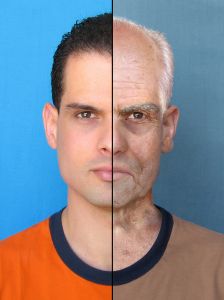Health with Age
As we age, we tend to have a pretty generalist view on how our health ought to be. It's common to equate aging with a decline in overall health and the gradual onset of a variety of age related illnesses along with certain physical and mental conditions.
There is a lot of interest in certain aspects of anti aging health strategies and products to attempt to hold back the march of time. But are such measures justified?
 The reality is that people are different and as such tend to age at different rates. Recent studies into the way in which diet can affect our physical aging process as well as environmental factors and stress have turned up some interesting results.
The reality is that people are different and as such tend to age at different rates. Recent studies into the way in which diet can affect our physical aging process as well as environmental factors and stress have turned up some interesting results.
Diet and Aging
Possibly some of the most fascinating information to surface due to diet studies has to do with the way in which our bodies age in relation to the way in which we consume food and liquids.
It has been known for some time that eating a poor, predominantly unhealthy diet over many years has a negative affect on overall health while being responsible for weight gain. But it is only more recently that diet has been positively linked with the body's rate of aging.
There is a strong link with the excessive storage of visceral fat and a variety of illnesses and health conditions such as diabetes and cancer. There are also well known links with obesity and heart disease, high cholesterol levels, hypertension and stroke.
Alongside a healthy diet, getting some daily exercise is also important for maintaining good health. Even walking out in the fresh air is good for you if you can't manage anything more strenuous.
Cell Activity
 Even more interesting is the link between calorie intake and the way in which cells repair themselves or die and are replaced by new cells.
Even more interesting is the link between calorie intake and the way in which cells repair themselves or die and are replaced by new cells.
There is strong evidence to suggest that the more often cells die and are renewed, the faster the aging process occurs. On the other hand, when cells are repaired rather than allowed to die, the aging process is slowed.
Recent studies have revealed that by restricting calorie intake, the body is forced into cell repair mode.
This can be brought about by regular fasting and by severely limiting the number of calories consumed each day, while ensuring the correct levels and balance of nutrients is still supplied through the diet.
What Does This Mean?
The conclusion you might draw from this is that by eating only the barest minimum of what the body needs, you can actually slow down the aging process. On the flip side, by overindulgence of too many high calorie foods and drinks, you are effectively speeding up the aging process.
No one yet knows by how much or how little this discovery will affect a person's life span, as it would need a life-term study to produce measurable data. But what is known is that those with highly restricted calorie intakes display slower aging indicators from physical attributes to mental agility.
It could all mean that by consuming much less and paying closer attention to what you are eating and drinking could have a positive effect on your health and aging process.
Note: Do not attempt severe calorie restriction or fasting without first consulting your doctor.